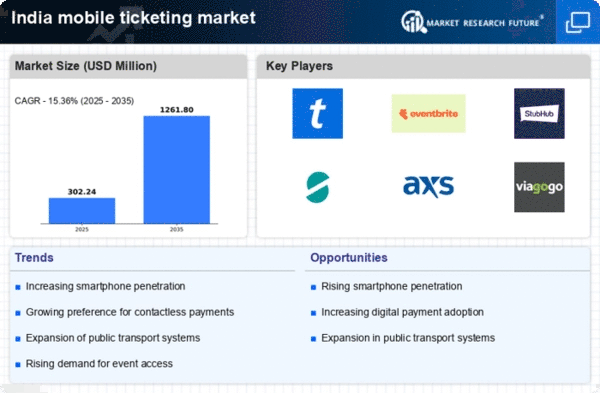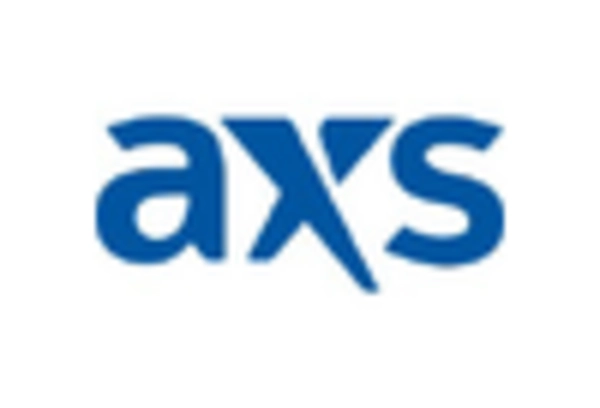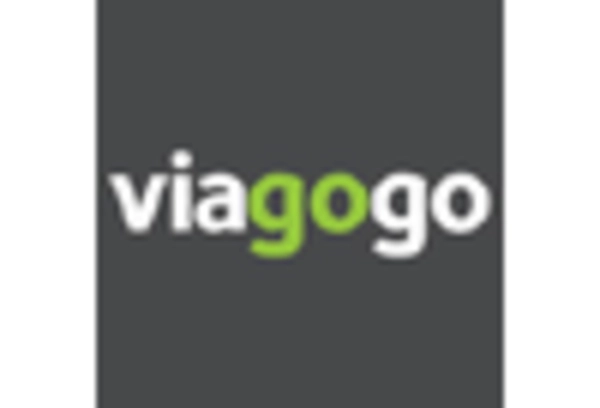Rising Digital Payment Adoption
The mobile ticketing market in India is experiencing a notable surge due to the increasing adoption of digital payment methods. As of 2025, approximately 70% of the population engages in online transactions, driven by the proliferation of mobile wallets and UPI (Unified Payments Interface). This trend indicates a shift in consumer behavior towards cashless transactions, which aligns seamlessly with the convenience offered by mobile ticketing solutions. The integration of secure payment gateways enhances user trust, further propelling the mobile ticketing market. Additionally, the government's push for a digital economy supports this growth, as initiatives like Digital India aim to increase internet accessibility and digital literacy. Consequently, the mobile ticketing market is likely to benefit from a broader user base that prefers the efficiency and speed of digital payments.
Government Initiatives and Support
The Indian government plays a crucial role in fostering the mobile ticketing market through various initiatives aimed at promoting digital solutions. Policies encouraging the adoption of technology in public services, such as the Smart Cities Mission, are likely to enhance the infrastructure necessary for mobile ticketing systems. By 2025, government investments in digital infrastructure are expected to reach $10 billion, facilitating the development of mobile applications that streamline ticket purchasing processes. Additionally, collaborations between government agencies and private tech firms may lead to innovative solutions that improve user experience. This supportive environment not only boosts consumer confidence but also encourages more businesses to adopt mobile ticketing solutions, thereby expanding the market. The proactive stance of the government indicates a promising future for the mobile ticketing market.
Urbanization and Increased Commuting
Urbanization in India is a significant driver of the mobile ticketing market, as more individuals migrate to cities for employment opportunities. By 2025, urban areas are projected to house over 50% of the population, leading to increased demand for efficient transportation solutions. This demographic shift necessitates innovative ticketing systems that can accommodate the growing number of commuters. Mobile ticketing offers a practical solution, allowing users to purchase tickets on-the-go, thus reducing wait times and enhancing the overall travel experience. Furthermore, the integration of mobile ticketing with public transport systems is likely to streamline operations, making it easier for commuters to navigate urban transit networks. As cities expand, the mobile ticketing market is poised to thrive, catering to the needs of a rapidly urbanizing population.
Growing Preference for Contactless Solutions
The growing preference for contactless solutions is a pivotal driver of the mobile ticketing market in India. As consumers increasingly prioritize health and safety, the demand for contactless transactions has surged. By 2025, it is estimated that over 60% of ticket purchases will be made through mobile devices, reflecting a shift towards minimizing physical contact. Mobile ticketing not only addresses these concerns but also offers convenience and speed, appealing to tech-savvy users. The ability to purchase and validate tickets without physical interaction aligns with contemporary consumer expectations. This trend indicates a broader acceptance of mobile ticketing as a mainstream solution, likely leading to sustained growth in the market. As contactless solutions become the norm, the mobile ticketing market is well-positioned to capitalize on this evolving consumer behavior.
Technological Advancements in Mobile Applications
Technological advancements are significantly shaping the mobile ticketing market in India. The rapid evolution of mobile applications, characterized by enhanced user interfaces and functionalities, is likely to attract a broader audience. As of 2025, the market is witnessing a 30% increase in the development of user-friendly applications that facilitate seamless ticket purchases. Features such as real-time updates, QR code scanning, and personalized recommendations are becoming standard, enhancing user engagement. Moreover, the integration of artificial intelligence and machine learning in mobile ticketing applications may provide tailored experiences, further driving adoption. This technological momentum suggests that the mobile ticketing market will continue to evolve, meeting the diverse needs of consumers and setting new standards for convenience and efficiency.
















